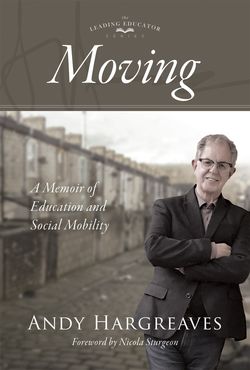Читать книгу Moving - Andy Hargreaves - Страница 11
На сайте Литреса книга снята с продажи.
CHAPTER 1
Move On Up
ОглавлениеSuch a boy is between two worlds of school and home; and they meet at few points.
—Richard Hoggart
I’m going to a university award ceremony at the top of a hill to receive first prize in a national competition. I’m not the only person who’s going. Many cars, shiny black classic ones, are heading up there in front of me. Looking down, I realize I’m not in the same kind of vehicle as theirs. I’m lying on my stomach, arms out in front of me, pulling my car and myself up the hill with my hands. It’s incredibly hard work. I look up. The other cars are getting away from me. So I pull harder, dragging myself forward, knuckles bleeding. Suddenly, I feel a surge of power in my arms. Improbably, I start to catch up. Then I overtake them. When I reach the summit, I’m the first to arrive.
It’s surreal. Literally. Then, the dream—for that’s what it is—turns into a back-and-forth composite of two scenes. In one, I’m surrounded by ethereal academics—Oxbridge and Harvard types—in an oak-beamed room. They’re asking me pointed questions about esoteric aspects of art, literature, and history. One shows me the parchment of a classic poem written by a famous ancestor of his, with barely discernible words in Latin, that he presumes I can interpret. I’m mystified by this and by other questions from his colleagues, and I clumsily bluff my way through them, acutely aware that he and the others may catch me out at any moment. These donnish scholars assume and almost insist I must already know all the answers to the competition I won, that it was all part of the cultured person I’m supposed to be. But they don’t know I looked up all the answers, spending hour after hour, day after day, deliberately memorizing what they imagined I should already have possessed. I succeeded illegitimately, it seems, and any moment now, someone will find out and my award will be null and void.
Meanwhile, in a parallel scene, a distinguished school superintendent on the selection committee is peering over his spectacles and sounding off about impractical education professors, their heads in the clouds, with no understanding of how to operate in schools in the real world. Somehow, I sense, these derisory remarks are directed at me and others like me. In this scene, I’ll get my award, but it won’t be deserved or worth anything to those I’m supposed to serve in the field.
This isn’t a fictional dream. When I was putting the final touches to this book, it’s one that woke me up, sweating, in the middle of the night. It doesn’t take a doctorate in psychoanalysis to interpret it. It’s about the experience of social mobility. Like Curtis Mayfield’s 1970 lyrics about the African American community that urges them to “move on up toward your destination, though you may find from time to time complications,” it’s a dream about a kind of progress that doesn’t come without personal struggle—without, in Mayfield’s words, having to “keep on pushing.”6
As many women, African Americans, impoverished immigrants, and people who come up from the working class know only too well, moving on up means pulling twice as hard with half as much as most of the others around you to make any kind of progress at all. And then, when you get there, wherever it is, even at the very top, there remains a feeling that you still may never be fully accepted or truly belong.
